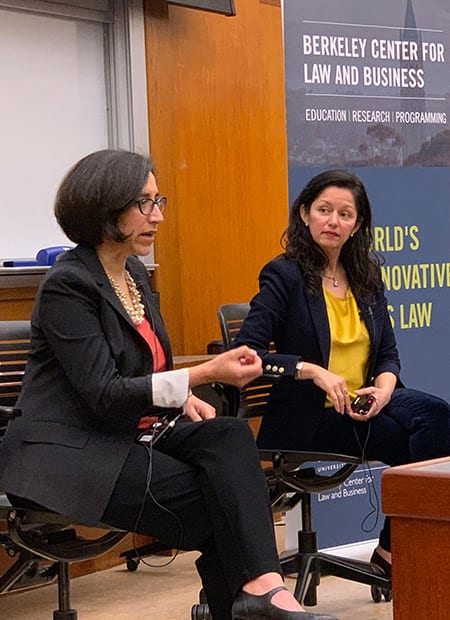By Andrew Cohen

Just days before joining Starbucks in April as the iconic company’s general counsel, executive vice president, and corporate secretary, Rachel Gonzalez ’94 realized there would be no soft landing.
At a Starbucks in Philadelphia, the arrest of two African-American men quickly went viral after someone recorded it on an iPhone and posted it on YouTube. The men had decided not to order until a third person arrived to join them for a business meeting.
When one asked to use the restroom, the Starbucks store manager said it was only for paying customers. She later told the men they couldn’t sit in the café without buying anything, and eventually called the police.
“It was absolutely reprehensible to us,” Gonzalez said during a recent Leadership Lunch Series talk presented by the Berkeley Center for Law and Business. “Our company’s response was swift and definitive, and we later announced we were going to close all our stores in the U.S. for anti-bias training.”
In a conversation with lecturer Amelia Miazad ’02, the director of Berkeley Law’s Business in Society Institute, Gonzalez described some of the thrills—and challenges—in overseeing Starbucks’ legal, ethics and compliance, and global security teams. The company has more than 350,000 employees worldwide, almost 29,000 stores in 78 countries, and more than 200 lawyers.
She also described the evolving role of general counsels and their increasing stake in company decisions, and how corporations are increasingly factoring social justice and environmental sustainability concerns into their decisions.
“It used to be that general counsels and legal departments confined themselves to giving advice about what a law or regulation says, but that’s an older model,” Gonzalez explained. “Now, GCs are business partners with their teams first and foremost. They own the decision as much as a commercial executive does, and if a decision goes wrong, they’re going to have to fix it.”
Staying socially conscious
Miazad, who co-teaches Berkeley Law’s Corporations in Crisis course, praised how Starbucks handled the arrest fallout.
“The response was swift and very apologetic,” she said. “‘This was wrong, and here’s what we’re going to do to address it.’ It seems obvious, but most companies say something very nuanced that feels negotiated between public affairs and the legal team. … To see transparency in unequivocal words is the right way to navigate crisis.”
After becoming a partner at Morgan Lewis, Gonzalez navigated away from Big Law and steered her career in-house. As chief administrative officer for Sabre Corporation, she led a global team responsible for human resources, corporate communications, legal strategy, corporate compliance, and regulatory and government affairs.
Gonzalez said she joined Starbucks in part because the company “has always stood for and embraced the notion that the pursuit of profit is not divorced from the pursuit of good. Those things can co-exist and do co-exist.”
She discussed the growing role of the company’s social impact team, and how its agenda includes environmental concerns that span the supply chain: from sourcing green coffee to roasting to packaging to distribution to customer delivery. While Starbucks designed its cup with recycling in mind, the company is exploring possible modifications as not all cities have the equipment that can recycle it.
Describing how certain stockholders at the company’s annual meeting complained that paying health care for part-time workers and providing benefits for same-sex workers cut into profits, Gonzlaez said, “They would be told, ‘If you don’t like it, go sell the stock.”
When asked about Starbucks CEO Howard Schultz, currently exploring a run for President, Gonzalez quelled any notions of baristas serving as campaign aides.
“He retired from the company last year, he’s no longer on the board, and he’s not the CEO,” she said. “Starbucks serves over 100 million customers every week from all party affiliations. Howard is an extraordinary man … but we don’t get involved in national political campaigns and partisan politics.”